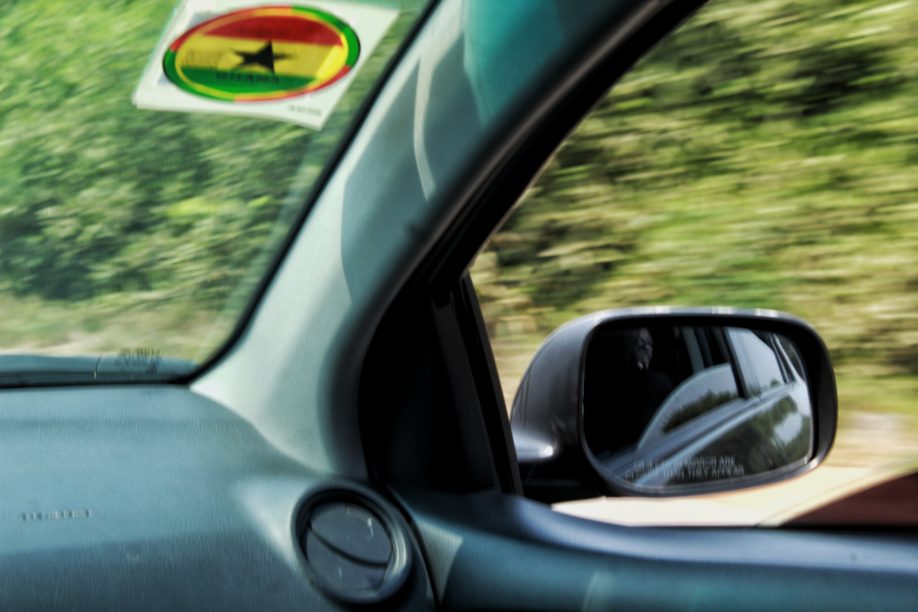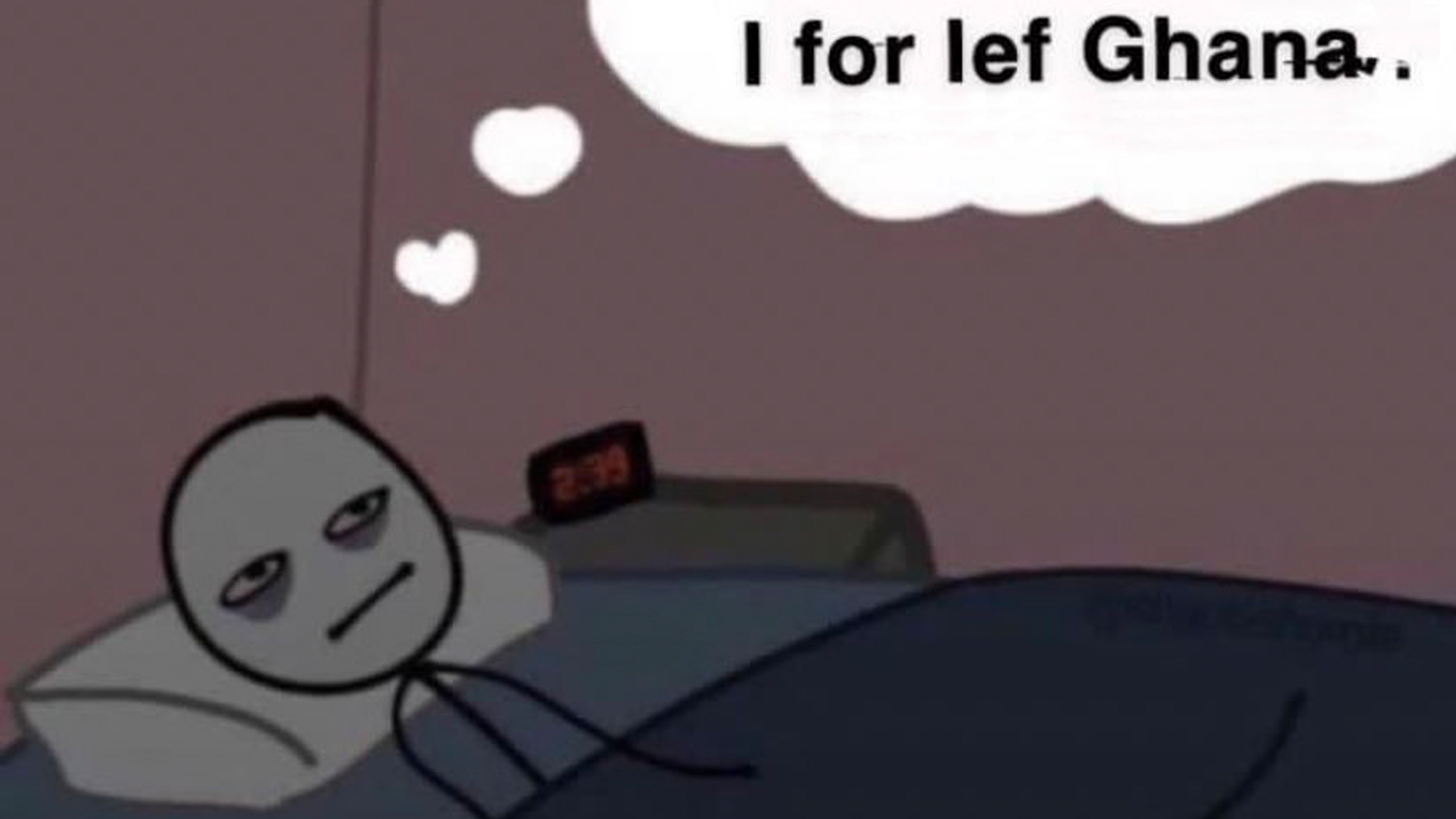I for lef Ghana, a pidgin phrase meaning “I need to leave Ghana,” has grown increasingly popular on Twitter in Ghana recently.
Five days of no water and still counting. Eii I for lef Ghana asap!
Here’s a visual proof of a village in Ghana whose only source of drinking water is muddy liquid. I fucking for lef Ghana.
What’s a fitting textual accompaniment to an image of this man looking so dispirited? I for lef Ghana.
What’s a relevant thing to tweet, with no context, no kind of attachment whatsoever? Chale, I really for lef Ghana.
It’s dire like that. As Warsan Shire writes in the famous poem, “Shark,”
no one leaves home unless home is the mouth of a shark
Twitter stresses me out. Still, I find it helpful and sometimes even fun—even if, in the case of Ghana, participants tend to be privileged, supercilious and Accra-centric, Twitter is still invaluable as a gauge of popular opinion.
I for lef Ghana is a sigh. Claudia Rankine once wrote, “The sigh is the pathway to breath; it allows breathing… The sighing is a worrying exhale of an ache.” So that when the shark’s trap of Ghana suffocates, one sighs, to catch one’s breath. “That’s just self-preservation,” Claudia Rankine says of the sigh.

The literal interpretation is equally compelling: I need to fucking leave. As millions have, ever since this country was named, in 1957, for the ancient West African empire. As Twene Jonas did, a young man with a large following across Ghanaian social media, now a resident of the US. In an old, undated video, an agitated Jonas is seen lamenting and rebuking Ghana’s corruption and incompetent leadership. He does the same in today’s videos, broadcast from the streets of America, direct to his tens of thousands of devoted viewers in Ghana.
The handle of a UK-based Twitter user, @ECG, is the same as the acronym for the Electricity Company of Ghana. “Ghana hates me,” this young Englishwoman tweeted in the spring of 2011. Frustrated Ghanaians had been tweeting their ire at her, to complain about the erratic power supply, erroneously supposing themselves to have been addressing the national electricity service provider. On April 13 this year, she quoted the tweet from 2011, adding: “Ten years on, and Ghana *still* hates me… #ECG.” Ghana has had three different presidents in the last ten years. Twene Jonas has changed, in his location and his appearance, but Ghana, not so much.
Part of Jonas’s shtick is to refer to Ghana as efuom (Akan for bush), and to his location, the States, as “heaven on earth.”
He reports “live from heaven on earth,” where “life is good, man.” And he’ll go on to offer commentary on whatever happens to be the rage-inducing topic of the day in Ghana. The country always provides him with plenty of material to rant about. He uses the (dominant) Twi language, and deadpan humour, to express shared sentiments with his audience, but he’s doing so from a place where a majority of them can be said to be dreaming of living.
One of the things I like most about Jonas is his absolute disrespect for the powerful. A number of viewers have appealed to him to stop insulting leaders much older than himself; there’s a cultural taboo against insulting the elderly. But while he is unafraid of attacking society’s sacred cows—political, traditional and religious leaders—and while he provides a decent analysis of some aspects of Ghanaian society, Jonas is not a countercultural figure. He is a homophobe; he has deeply internalized anti-Blackness (he thinks Black people are stupid and useless, and African-Americans are lazy), and there is not an iota of analysis of the American society that he inhabits (in his own words, translated: “There is nothing like racism here in America; Black people here, and in Africa, are the most racist people.”)
These aren’t unfamiliar sentiments in Ghanaian society, where collective sensibilities are deeply informed by generations of white supremacist indoctrination. Jonas may be over there, but he remains a tissue of the Ghanaian shark. Unlike the wise speaker in Warsan Shire’s “Home,” the shark invariably fails to consider the underbelly of “heaven on earth,” where, according to this sage, it is:
go home blacks
refugees
dirty immigrants
asylum seekers
sucking our country dry
[…….] with their hands out
they smell strange
savage
messed up their country and now they want
to mess ours up…
To be fair, one whose house is on fire wouldn’t pass up the offer of refuge in a freezer. For the person who needs to leave Ghana, is the lesser evil the unalloyed good? Or is it a matter of the known devil, versus the one as yet unknown?
 courtesy of the author
courtesy of the authorI was recently at dinner with an acquaintance. Over our meal, we chatted about art in Ghana. It’s increasingly hard to survive here on the precarious income of a freelance writer, I told her. I pursue other artistic interests alongside, though none provides a viable livelihood on its own. Still, over the years, I’ve remained resolute in my refusal to leave my continent. But there have been many times, at least in the last five years, that I’ve reconsidered this stance.
It was a pleasant night, at the end of which I walked with her to get her taxi.
When I got home I found she’d left a message: “Lovely to have a chat today, my dear. I was just thinking about parts of our conversation in terms of what it takes to get out of an abusive relationship. Sometimes to get out of that situation you have to go further from your community than you’d ever choose for yourself. That distance is about choosing yourself, rather than giving up on home. It’s the distance that allows the access to the resources and support systems that can allow you to return your community eventually on terms you can consent to.”
As I write this, my passport is expired, and I don’t have enough disposable income to spend on renewing a travel document; and so, for the moment at least, the matter is settled.






